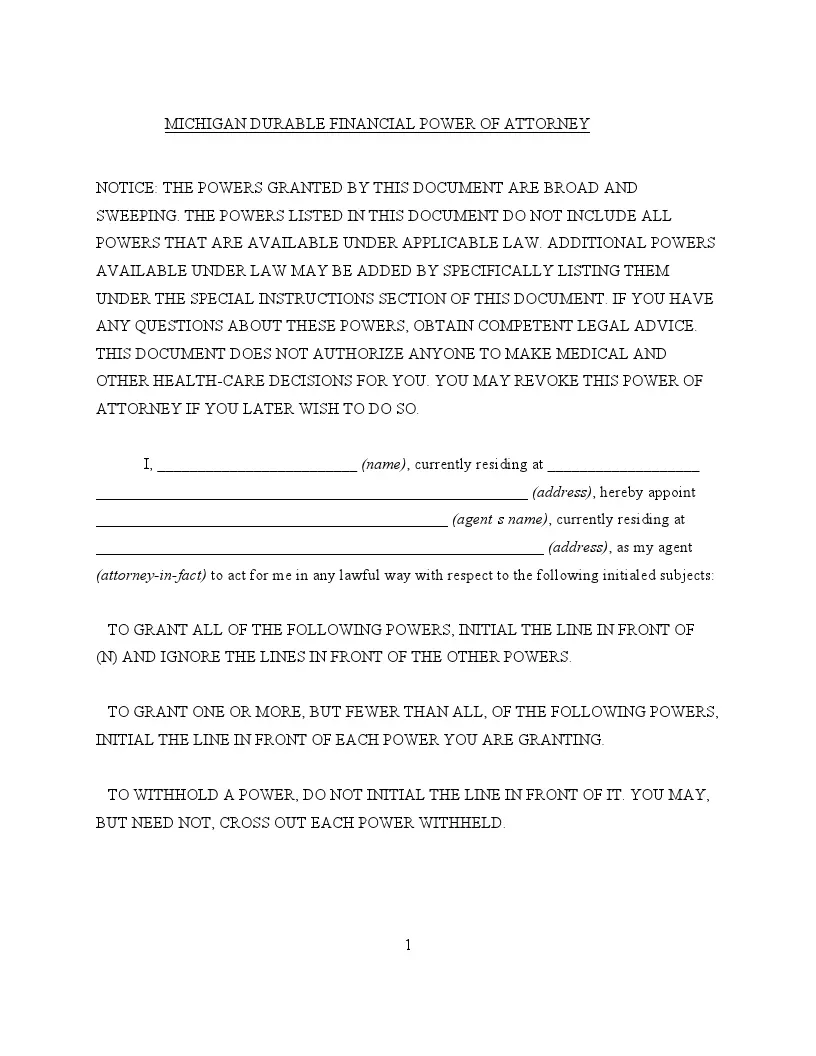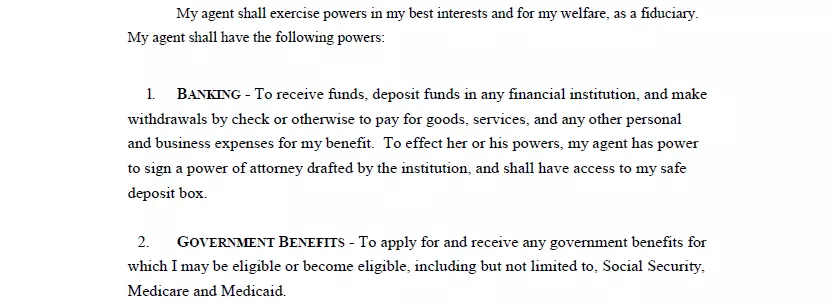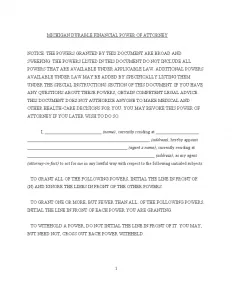Free Michigan Durable Power of Attorney Form
A legal form named the Michigan Durable Power of Attorney is a document created by a Michigan resident over 18 years old to appoint a special agent to make finance-related decisions on behalf of the resident. Such forms come in handy in cases of the creator’s incapability of making financial decisions by themselves as a result of a severe medical condition like dementia or coma.
The word “durable” implies that the document can be considered valid and legitimate for a considerable period of time. Once the creator of the form has died or has found it necessary to call it off, the document becomes invalid. Revoking the previous DPOA form (if any) is required to initiate the completion of a new one.
Mind that the USA residents can grant full access to dealing with the financial matters on their behalf by creating, signing, and notarizing the Durable Power of Attorney form. If one needs a special agent who will manage health-related issues on behalf of the principal, one should consider filling out the Medical Power of Attorney form.
Michigan power of attorney forms – this section will let you know more about some other powers of attorney you can use in Michigan.

Build Your Document
Answer a few simple questions to make your document in minutes
Save and Print
Save progress and finish on any device, download and print anytime
Sign and Use
Your valid, lawyer-approved document is ready
The DPOA document empowers any Michigan resident over 18 to exercise their will to grant certain powers to designated agents. The agents should be reliable and responsible to embrace the legitimacy and the proper effect of the entire operation. You can appoint a member of your family to become your DPOA agent as well as contact a legal professional for the matter.
When a group of people is signing a DPOA form, every member has to be of a sound mind, which is usually prescribed by law. Most likely, you will have to notarize the form: the majority of states demand it. Some states require signing by a witness (or witnesses) as well.
Michigan Signing Requirements and Laws
Sections 700.5501 through 700.5504 of the Michigan Compiled Laws (MCL) provide basic requirements and regulations regarding the Michigan Durable POA form. As stated in section 700.5501, signing the form should be accompanied by a notary and two witnesses.
According to MCL Section 700.5504, in case of your death, an agent, who acts on your behalf conscientiously and has got no information about your death, has full power to continue to act. The DPOA does not lose its legal force.
As it is stated in Section 700.5503, if you have a trustee, then this person also has the same rights as you have to nullify the DPOA or change some points in it.
According to Section 700.5502, if you get some serious health problems and want to have an agent, the DPOA will have the same legal force as if you were in good health. It also means that in both cases, the agent can act on your behalf in financial matters.
You can rewrite DPOA at any time you want, but it’s important to notify your immediate surroundings about your new decision. After creating a new DPOA or after your death, the agent loses his power to make decisions for you.
The process of filling out the DPOA form in Michigan is simple and quick. The form itself comprises seven pages. Enlist plausible actions you allow your agent to take on your behalf, including dealing with:
- Taxation matters
- Stocks and financial bonds
- Real estate
- Banks and other financial institutions
You can also specify some other decisions your agent will be able to make. Before you create the document and sign it, read all the statements carefully and think twice before you proceed to choose the agent. Check the relevance of all the statements you chose and continue with filling out the DPOA form.
To create the DPOA form in Michigan, it is suggested that you print out three copies of the document as recommended, choose and converse with the agent-to-be, and contact a notary public.
Michigan Durable Power of Attorney Form Details
| Document Name | Michigan Durable Power of Attorney Form |
| Other Names | Michigan Financial Durable Power of Attorney, MI DPOA |
| Relevant Laws | Michigan Compiled Laws, Sections 700.5501 to 700.5520 |
| Signing Requirements | Notary Public and Two Witnesses |
| Avg. Time to Fill Out | 10 minutes |
| # of Fillable Fields | 37 |
| Available Formats | Adobe PDF |
Popular Local Durable POA Forms
Durable POA documents are frequently in each and every state. Check some other popular Durable POA forms frequently searched for by people.
Steps to Complete the Form
To minimize legal risks and embrace accuracy while filling out a DPOA form, we strongly recommend using our form-building software presented on our website. Here are the step-by-step guidelines to assist you in the process of creating the DPOA form:
1. Download the Template
Having obtained the template, proceed to input the name of the county where the form is being created. Fill in the first line of the document for the matter.
Alternatively, use our document builder that will guide you through the process step by step.
2. Insert information about yourself and the agent
In Michigan, the DPOA form starts with inserting the principal’s name and address (mailing and physical) and the agent’s name and address (mailing and physical).

3. Choose the Effective Date
Here, you should choose the effective date of your DPOA form. In Michigan, you may opt for the form effectiveness from the moment of signing or from the day when your physician determines your incapability.

4. Specify the Agent’s Responsibilities
In this section, you have to choose what to delegate to your agent or attorney. In Michigan, the list of financial matters in the DPOA form consists of:
- Real property questions
- Taxation operations
- Plan for retirement
- Presents
- Personal possessions
- Borrowing and lending money
- Powers to manage the property
- Legal advice and proceedings
- Safe-deposit box
- Insurance transactions
- Banking operations
- Governmental benefits
To help the principal fully understand all the requirements and statements of the DPOA document, the form provides descriptions of the items. All the enlisted items can be chosen by a principal. Particularly, financial matters are chosen by initialing the blank space on the left side of the form.

5. Leave Special Instructions for the Previous Section
In the following part, you can specify the other finance-related instructions, which can grant or withdraw certain powers from your agent. If there is nothing you wish to specify, leave the word “None” in the designated field.

6. Read the Following Text
The text below the “Special Instructions” section includes some rules that are applicable to this DPOA form in Michigan. As a principal, you have to read them thoroughly and accept them. If something is still not clear, you may consult your lawyer.
7. Add a Date and Sign the DPOA form
After reading and understanding the notice, you should sign the DPOA form and add a relevant date.

8. Have Two Witnesses Sign the document
To provide complete legitimacy, you should ensure that two witnesses sign the DPOA form and input their current addresses. Witnesses cannot be DPOA agents in the same document.

9. Ask a Notary to Sign
After both witnesses have signed the DPOA form, a notary checks the document and verifies it by leaving their signature, adding a signing date, and sealing (if necessary).

10. Give the DPOA form to Your Agent or Attorney
The last page of the DPOA form in Michigan is for the agent’s acceptance of the appointment. Your agent (or attorney) should accept all the financial matters you are delegating, insert his or her name, and sign the DPOA form.
11. Ask a Notary to Sign Again
When your agent has accepted and signed the DPOA form, a notary should verify his or her signature and sign the document one more time.

More popular Michigan templates readily available for download on FormsPal and that can be personalized in our simple document builder.
Download a Free Michigan Durable Power of Attorney Form
